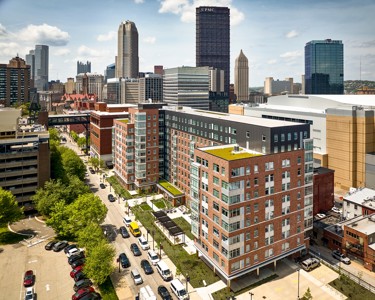
Duquesne University: Campuswide Housing Repositioning
Radnor – Harrison Street JV
In the mid-2010s, Duquesne University faced a series of multifaceted challenges: declining enrollment; increasing expenses; and a backlog of deferred maintenance. To position itself more competitively, it identified parallel needs to restructure academic programming and enhance the student experience. The University set out to find a partner who could deliver a comprehensive approach to modernize student housing, enhance campus identity, and strengthen Duquesne’s financial position through asset monetization and capital reinvestment, while preserving University control. Beyond the much-needed infusion of capital, the University sought to shed long-term operating risk for auxiliary services, a challenging and complex area for many institutions. Duquesne found the solution in a sole source, $190 million, multi-phased public private partnership with Radnor Property Group and Harrison Street. This all-equity, multi-phased initiative monetized existing assets, transformed nearly 2,000 outdated beds into modern accommodations, and drove a campus-wide revitalization. The singular counter-party structure, notably free from traditional bank debt and restrictive covenants, provided Duquesne with exceptional flexibility in funding new projects and navigating unforeseen challenges, like the pandemic. A key element of the financing was the University's preferred approach of a fee simple sale of assets and land for each project, even those centrally located on campus. This strategy optimized balance sheet treatment and maximized monetization potential. Critically, Duquesne retained control through restrictive deed covenants and repurchase options, effectively positioning itself as the primary future purchaser. A collaborative relationship was codified in a 70-year cooperation agreement, incentivizing the University’s short and long-term support to achieve occupancy targets and maintain the building as an on-campus community. Finally, outperformance sharing clauses further solidified the alignment of interest between parties. The redevelopment initiative encompassed renovation, repositioning, and new construction to shift the housing stock from traditional dorms to modern, amenitized, private accommodations. The initiatives included Brottier Hall, St. Martin Hall, and McGinley Hall, spanning 7 years, with the most recent successfully delivering for fall 2024. To date, the partnership has repositioned 44% of the University's housing stock, de-densified the portfolio by 5% while increasing campus-wide housing revenue by 51%, and contributed to an increase in enrollment since 2022. Duquesne also experienced a 180% increase in net assets since 2017. Critically, Moody’s affirmed the projects' credit-positive impact, with the University’s auditor confirming the assets were successfully transferred off-balance sheet, a testament to the financial ingenuity of the P3 partnership. Radnor's strategic financial structure, utilizing 100% equity without reliance on bank debt or other outside financing, proved crucial to the partnership. At the outset, the Radnor-Harrison Street JV deeply underwrote the institution, understanding the University’s programmatic changes and strategies to reposition itself. This approach allowed the JV to move and fund quickly, adapt to different project types, and uniquely scale for each project’s check size, from $40 MM to nearly $100MM. Leveraging its joint venture with Harrison Street, Radnor contributed not only financial strength by committing all capital required on day one, but also deep expertise in facilitating higher education partnerships. Their redevelopment structure enabled a flexible, phased approach, allowing Duquesne to address its most pressing needs first while minimizing disruptions to campus life. The first phase laid the foundation for the partnership through the transformation of Brottier Hall, a 25-story high-rise apartment with significant deferred maintenance. Radnor implemented a phased, four-summer renovation (completed 2021, $65 million, 3% under budget). This approach kept all beds online during the academic year while incrementally revitalizing the building, resulting in a complete transformation. Brottier Hall is one of the most desirable on-campus communities, consistently maintaining over 97% occupancy. Building on Brottier’s success, the partnership turned its attention to St. Martin Hall. The result was a highly cost-effective, complete repositioning of the building from an antiquated facility to a modern community. This $40 million investment, de-densifying student occupancy by 35% while increasing total revenue by 4%, demonstrated the partnership's ability to anticipate and meet the evolving needs of students. Since its renovation, St. Martin applications have been oversubscribed by 35% every year. St. Martin was completed in 2022, 2% under budget. The most recent phase of the partnership shifted to support the revitalization of Forbes Avenue, the town-gown edge, with a project that would complement the construction of a new medical school and renovation to the athletic arena. McGinley Hall, an 11-story facility, was constructed on a prominent corridor along Forbes Avenue. Completed in August 2024, this $85 million project, completed 1% under budget, marks the University’s first ever purpose-built apartments and the first on-campus student housing facility in over a decade. It also critically addresses the University's modern housing needs for graduate and professional students – a growing demographic due to the University’s expanded academic programming. Each project in this partnership substantially redeveloped focal points on three distinct areas of campus, dramatically enhancing the overall campus fabric. The successful completion of these projects demonstrates how strategic collaboration can revitalize campus infrastructure, improve the student experience by providing modern and desirable living spaces, and, most importantly, strengthen a university's financial standing. Matthew Frist, Duquesne University’s Senior Vice President of Finance and Business, affirms: “These P3 housing projects, along with monetizing its energy plant, allowed the University to reposition and strengthen its balance sheet, freeing it to invest and launch a College of Medicine without negatively impacting our above average (A) credit rating.” By transferring project risk and leveraging private sector expertise, Duquesne optimized capital allocation, freeing resources for strategic investments in its future. Furthermore, the shared financial incentives, including outperformance sharing, aligned the partners' interests and fostered a mutually beneficial and sustainable long-term relationship. The Duquesne-Radnor-Harrison Street partnership not only provides a compelling model for other institutions seeking to address similar challenges, but it also establishes a strong foundation for Duquesne's continued growth and success in the increasingly competitive higher education landscape. With three significant projects completed under budget and on time, Radnor, Duquesne, and Harrison Street have created a fruitful and collaborative partnership for years to come.